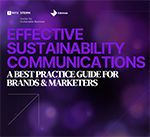 |
Effective sustainability messages can also kickstart a brand’s reach and relevance, according to new research from the NYU Stern Center for Sustainable Business and Edelman.
"Effective Sustainability Communications: A Best Practice Guide for Brands & Marketers" partnered with R&D, innovation, sustainability and marketing teams at nine leading global brands representing such sectors as apparel, food and beverage, technology, household items and personal care to find out which environmental sustainability claims are most motivating to consumers.
The results of the study, which were unveiled at the Cannes Lions Festival by Randi Kronthal-Sacco, senior scholar at NYU Stern Center for Sustainable Business, and Edelman CEO Richard Edelman show that a potent sustainability message can lift brand reach and relevance between 24 and 33 percentage points compared with a high-performing category message alone.
Sustainability claims yielded a significant benefit across the board, with all nine brands seeing a claim centered on sustainability as either the most appealing (two of nine brands) or the top most in consumer appeal (seven of nine brands), outperforming other category claims.
 |
In general, the 2,700 consumers surveyed showed a preference for simple, jargon-free sustainability messages that connect directly to them, their family and the world around them.
They also said that a brand’s sustainability claims need to be grounded in its core purpose. “Sustainability claims that ladder to relevant category claims are the most appealing,” it says. In other words, sustainability means more to consumers if it also bears a strong relation to the basic reasons for buying a brand (taste, effectiveness, etc.)
Consumers also had strong reactions to claims regarding animal health, sustainable sourcing, local sourcing, and children and future generations. Support for local farmers was also very positively viewed.
It also matters where consumers come into contact with sustainability messaging. Packaging, TV, and in-store signage were deemed the most effective venues for those messages, with platforms like TikTok and Instagram lagging behind. One big exception: Gen Z. For Gen Z respondents, TikTok was almost as effective as packaging and TV.
Interestingly, the research also showed that the top performing claims varied little across political or demographic divides.
“Every leader thinking twice about sustainability on the grounds of it being ‘divisive’ needs to know this: If you communicate sustainability the right way, it will appeal across political affiliation, income, gender, education levels, and age groups," said Edelman. "Sustainability is an amplifier and if brands embrace it, we can exponentially increase growth and trust."


 Gen Z’s concern for environmental issues is a reflection of living in a world fraught with uncertainty, underscoring the importance for brands to craft messages that align with this generation’s values.
Gen Z’s concern for environmental issues is a reflection of living in a world fraught with uncertainty, underscoring the importance for brands to craft messages that align with this generation’s values. A Biden administration, and now a Democrat-controlled Senate and House, are set to fuel a boom in the cleantech / renewable energy / sustainability sectors. Communicators in those sectors need to prepare for takeoff.
A Biden administration, and now a Democrat-controlled Senate and House, are set to fuel a boom in the cleantech / renewable energy / sustainability sectors. Communicators in those sectors need to prepare for takeoff. Austin-based Treble offers pro bono PR services to greentech start-ups with financial backing.
Austin-based Treble offers pro bono PR services to greentech start-ups with financial backing. Publicis Groupe has acquired London-based sustainability communications shop Salterbaxter with plans to align the firm under MSLGroup.
Publicis Groupe has acquired London-based sustainability communications shop Salterbaxter with plans to align the firm under MSLGroup.


 Have a comment? Send it to
Have a comment? Send it to 
No comments have been submitted for this story yet.